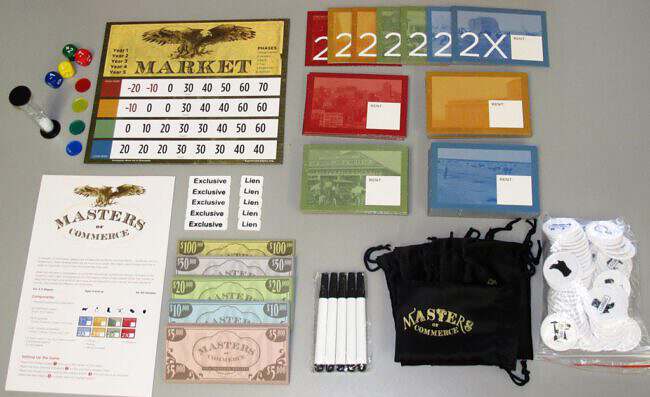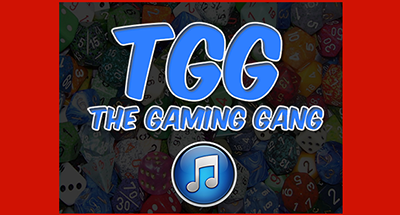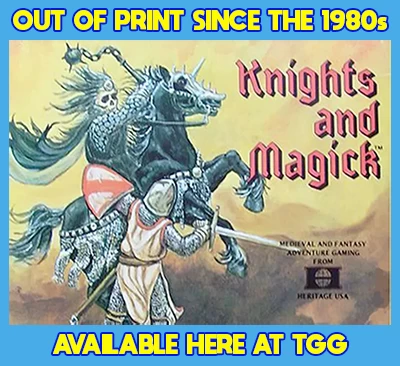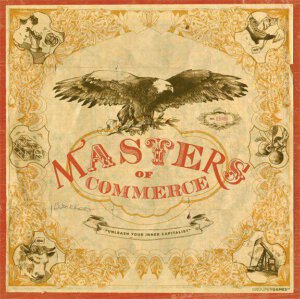
Publisher: Grouper Games
Designer: Britton Roney
Year: 2011
Players: Three to eleven players
Ages: 8+
Playing Time: 30-45 Minutes
Genre: Economic themed auction party game
MSRP: $40.00
If you’re the type of gamer who tends to have a houseful of friends over on a Saturday and find multiple games running at the same time because A) you’re not really “party game” gamers or B) can’t find something that can accommodate ten or more of you it’s possible you might want to give Masters of Commerce a shot. Up to eleven people can play (not sure who came up with eleven…), it takes no more than ten minutes to break down the rules for everyone, and you may just find that you learn something about the inner workings of capitalism while you play. This isn’t to say Masters of Commerce (MoC from here out) is any exceptionally deep economic simulation but more of a wheeling dealing experience with a lot of appeal.
Players are broken up into landlords and merchants. Everyone is out for themselves, as there are no teams, so you’ll be competing with other players on the same side of the economic fence: landlords against landlords and merchants against merchants. Landlords begin the game owning three properties and the merchants are looking to rent these properties. At the end of the game one winner of each profession are considered the winners.
Each round begins with a negotiation phase and this can easy break down into almost a mini view of the Chicago Stock Exchange in no time as everyone is yelling and haggling across the table – or floor if you don’t have the table big enough to seat the group. Landlords are looking to entice merchants into renting property while merchants are looking to get the best deal. If a deal is struck, the landlord writes the rent price on the property card and places the appropriate merchant token on the property. No deal is final though until time runs out and the only thing set in stone is the rent agreed upon; players can wheel and deal other side agreements as well. Not every property is the same so this leads to some serious negotiating as to who will take what at what price and if the deal needs to be sweetened to move into a less than stellar spot. Part of the fun is hearing some of the agreements that are made on the fly and watching other players use the same tactics later in that same game.
There is some luck involved as you never know what the economy will bring in a given round. The landlords know what they’ll be making on their agreed upon rent but the merchants have a “dicey-er” time of it. Properties come in different colors and some, such as blue, provide a steady income yet no chance for a big payout in a boon economy. Red, on the other hand, is a risk because a bad economy costs a merchant out of pocket and no profit with red but can really crank out a sweet payout if the economy is clicking!
A die is rolled for each of the four colors to determine the economy for all property and based on those rolls merchants receive their profits and pay their rent. Well, hopefully they pay their rent… What? My Starbucks isn’t 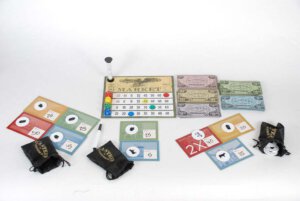
Landlords just don’t sit back and rake in the dough as they have their own issues to deal with. The first is property tax they have to shell out. In a bad economy they might even have to sell back properties just to pay their taxes! There’s also an auction for new properties that the landlords take part in as they continue to grow their real estate empires. Some of these are even properties which provide a merchant a chance to double their profits. Rent is still negotiated regardless if that double payout could be achieved but it gives the landlord who owns the prime location a real carrot to wave around. Or cookie, if you like cookies…
After five rounds of negotiating, renting, raking in dough (or not) as a landlord or merchant, and auctioning new properties the game ends. Simply enough it’s all about the Benjamins so the landlord and merchant with the biggest bankrolls are the winners.
The components are pretty nice overall and I was surprised at this seeing that Grouper Games is pretty new to the scene. I find paper money to be a turn off though as it kicks my Monopolyphobia into high gear. Plus, if you’re playing with people who aren’t dedicated gamers, who believe in leaving a game in the same condition they found it, that paper money could get trashed rather quickly. I will also recommend you utilize an audible stopwatch or smart device timer app as the included egg timer is mainly ignored since no one is paying attention to it as the action is flowing! Hmmm… Just when did that sand run out?
MoC is an interesting game and does convey a real sense of supply and demand but I do have a few issues with the title. No two games will be the same due to the randomness of the economy. That might be a drawback for some but I believe that it’s a good fit for the title’s target audience.
The game plays very quickly, and keeps just about everyone involved, but one thing that can bring the game to a grinding halt is if a merchant cannot pay their rent. This does happen as the economy can, and does, fluctuate and you might find yourself playing games where you’d think it was the Great Depression. According to the rules if you fall into debt with a landlord they seize the income of another of that merchant’s properties in the next round. If the merchant falls in debt to another landlord before that first debt is paid out, then the merchant is out of the game. This does happen and can throw the game into a tail spin as there will be less demand for properties from there on out. This sounds right in capitalist theory but the real world has shown us plenty of companies that continuously go through bankruptcy because they can’t pay their bills. The airline industry comes immediately to mind! A better option is for the landlord and renter figure out what they can agree to that’s satisfactory for both parties. MoC isn’t a game for people to get worked up about and a guarantee of some easy resolution can get everyone back on track in a jiffy.
I know the box states you can play with between three and eleven players but I don’t see the game being all that fun for less than six and I certainly wouldn’t recommend playing with an odd number of players either. I can’t say for sure, as I’ve only played with four or five other gamers, but my gut reaction is a lot less excitement which could even be yawn inducing; a lot of the appeal of the game is having a bunch of people doing what they can to score a good deal in a short period of game time. Also, the odd numbered player is automatically a merchant and that tends to make the game a much easier ride for the landlords than the merchants.
At the end of the day MoC will be a blast for an even numbered, and large enough, group of gamers. Regardless of how many people involved the playing time remains right about the same. Each faction, either landlord or merchant, is equally entertaining and neither is a bigger draw to play than the other. And you may just learn something new about this crazy thing out there called capitalism. So if you’re looking for something other than those same old trivia/guessing pictures/snore inducing party games that some folks pull out with a large group, Masters of Commerce should be joining your game collection! Pretty high praise coming from a reviewer who has no time for the typical party game styles found on the shelves at WalMart or Toy ‘R Us.
[rwp-review id=”0″]


